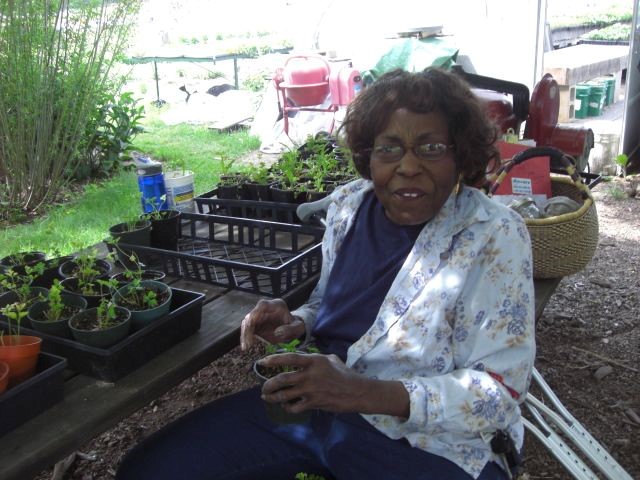A Lenten Devotion by Mary Memmott
Remember the days of old; consider the generations long past. Ask your father and he will tell you, your elders, and they will explain to you.
Deuteronomy 32:7
One of those wise elders for Grace Church, to me, was Karolyne White. She often came to intergenerational events, or helped with Sunday school, and quietly drew in the children with a question, or an observation, that made them want to hear more.
One Saturday we organized a work group for Stearns Farm. Karolyne could not bend to plant in the fields, so she transplanted seedlings at the picnic table. I was on “soup duty” to put together the soup for the day’s work crew, so I was also near the picnic tables. At some point I went over to check on Karolyne, and now there was a small African-American boy sitting next to her, not from our group. He needed a break from the tiring farm work. So I introduced myself and said I would be making the “stone soup” for lunch — donated veggies turned into a meal. Karolyne was in her element — finally, here was someone to teach — and the boy looked too tired and bedraggled to get up and leave. “Do you know what stone soup is, young man?” She asked him. He shook his head, no. “Well, then…” And she proceeded to tell him the folk tale, no detail left out — the little boy listened with wide eyes. If she had been able to work beyond the picnic table, she wouldn’t have been sitting quietly when this little guy sat down. And if he hadn’t run out of steam for the fields, she wouldn’t have had a student to teach. They sat together for quite a while until everyone returned for lunch, to eat their stone soup.
I told this story at Karolyne’s memorial service a few years ago, so some of you reading this may have heard it before. If you did not know Karolyne, she was a lifelong educator, an active church member, a mother, and a participant in Framingham civic life. But she had also suffered — from physical ailments, losses, discrimination. I remember another time she told a story when she and I were teaching Sunday school — a year or two before she died. These children were older, ready for more advanced stories. Somehow, randomly, the state of Indiana came up in conversation. “Indiana,” mused Karolyne, “don’t get me started, I hate that state.” Well, we had to ask some questions after that opener. Why would anyone particularly hate Indiana? When Karolyne was a young mother of two girls they lived in Indiana, briefly. Her husband was away, and she was alone with them. At the end of their quiet road one night there was a large, noisy KKK meeting. Karolyne was terrified, but also annoyed and angry. “They wouldn’t stop playing Dixie on their stupid car horns! It kept us up!” And with great meaning she told us, “and I couldn’t call the sheriff.” “Why not?” we had to ask. “Well, I knew for sure he was at that meeting himself.” There was fear, but also anger, and annoyance in her tone. For the children that day in Sunday school, this story suddenly brought the reality of hate groups to life. The fact that this happened in Indiana, not the “traditional” Jim Crow South they learned about in school, made the story even more important. We were privileged to hear it from the source.
I only knew Karolyne for a small part of her life. There were probably many other times when she shared her wisdom, and many opportunities that I missed when I failed to take her up on the invitation to a story. But I am grateful for the opportunities I had — and that she made — by generously sharing her wisdom of the “days of old.”

Mother God, help me to slow down, and ask my elders to share their wisdom. And when I am asked, let me be generous, and honest, even when the memories are painful.